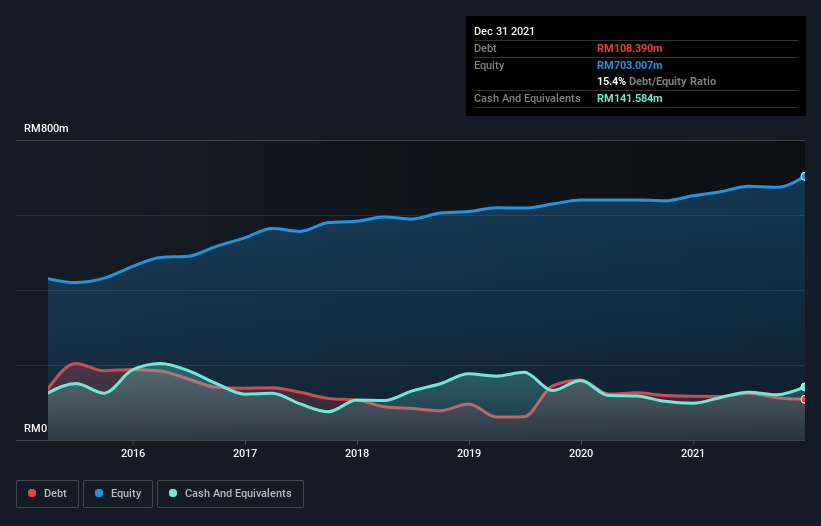- Malaysia
- /
- Real Estate
- /
- KLSE:TAMBUN
Tambun Indah Land Berhad (KLSE:TAMBUN) Seems To Use Debt Rather Sparingly
Legendary fund manager Li Lu (who Charlie Munger backed) once said, 'The biggest investment risk is not the volatility of prices, but whether you will suffer a permanent loss of capital.' When we think about how risky a company is, we always like to look at its use of debt, since debt overload can lead to ruin. Importantly, Tambun Indah Land Berhad (KLSE:TAMBUN) does carry debt. But is this debt a concern to shareholders?
When Is Debt A Problem?
Debt and other liabilities become risky for a business when it cannot easily fulfill those obligations, either with free cash flow or by raising capital at an attractive price. Ultimately, if the company can't fulfill its legal obligations to repay debt, shareholders could walk away with nothing. However, a more frequent (but still costly) occurrence is where a company must issue shares at bargain-basement prices, permanently diluting shareholders, just to shore up its balance sheet. Of course, the upside of debt is that it often represents cheap capital, especially when it replaces dilution in a company with the ability to reinvest at high rates of return. When we examine debt levels, we first consider both cash and debt levels, together.
View our latest analysis for Tambun Indah Land Berhad
What Is Tambun Indah Land Berhad's Debt?
You can click the graphic below for the historical numbers, but it shows that Tambun Indah Land Berhad had RM108.4m of debt in December 2021, down from RM116.5m, one year before. However, its balance sheet shows it holds RM141.6m in cash, so it actually has RM33.2m net cash.

How Strong Is Tambun Indah Land Berhad's Balance Sheet?
The latest balance sheet data shows that Tambun Indah Land Berhad had liabilities of RM56.7m due within a year, and liabilities of RM88.3m falling due after that. Offsetting these obligations, it had cash of RM141.6m as well as receivables valued at RM149.5m due within 12 months. So it can boast RM146.1m more liquid assets than total liabilities.
This luscious liquidity implies that Tambun Indah Land Berhad's balance sheet is sturdy like a giant sequoia tree. On this view, lenders should feel as safe as the beloved of a black-belt karate master. Simply put, the fact that Tambun Indah Land Berhad has more cash than debt is arguably a good indication that it can manage its debt safely.
Even more impressive was the fact that Tambun Indah Land Berhad grew its EBIT by 137% over twelve months. If maintained that growth will make the debt even more manageable in the years ahead. The balance sheet is clearly the area to focus on when you are analysing debt. But it is future earnings, more than anything, that will determine Tambun Indah Land Berhad's ability to maintain a healthy balance sheet going forward. So if you want to see what the professionals think, you might find this free report on analyst profit forecasts to be interesting.
Finally, a business needs free cash flow to pay off debt; accounting profits just don't cut it. Tambun Indah Land Berhad may have net cash on the balance sheet, but it is still interesting to look at how well the business converts its earnings before interest and tax (EBIT) to free cash flow, because that will influence both its need for, and its capacity to manage debt. Over the last three years, Tambun Indah Land Berhad reported free cash flow worth 11% of its EBIT, which is really quite low. For us, cash conversion that low sparks a little paranoia about is ability to extinguish debt.
Summing up
While it is always sensible to investigate a company's debt, in this case Tambun Indah Land Berhad has RM33.2m in net cash and a decent-looking balance sheet. And we liked the look of last year's 137% year-on-year EBIT growth. So we don't think Tambun Indah Land Berhad's use of debt is risky. There's no doubt that we learn most about debt from the balance sheet. But ultimately, every company can contain risks that exist outside of the balance sheet. Case in point: We've spotted 2 warning signs for Tambun Indah Land Berhad you should be aware of.
If you're interested in investing in businesses that can grow profits without the burden of debt, then check out this free list of growing businesses that have net cash on the balance sheet.
Valuation is complex, but we're here to simplify it.
Discover if Tambun Indah Land Berhad might be undervalued or overvalued with our detailed analysis, featuring fair value estimates, potential risks, dividends, insider trades, and its financial condition.
Access Free AnalysisHave feedback on this article? Concerned about the content? Get in touch with us directly. Alternatively, email editorial-team (at) simplywallst.com.
This article by Simply Wall St is general in nature. We provide commentary based on historical data and analyst forecasts only using an unbiased methodology and our articles are not intended to be financial advice. It does not constitute a recommendation to buy or sell any stock, and does not take account of your objectives, or your financial situation. We aim to bring you long-term focused analysis driven by fundamental data. Note that our analysis may not factor in the latest price-sensitive company announcements or qualitative material. Simply Wall St has no position in any stocks mentioned.
About KLSE:TAMBUN
Tambun Indah Land Berhad
An investment holding company, engages in the property development and management in Malaysia.
Flawless balance sheet and undervalued.
Market Insights
Community Narratives


